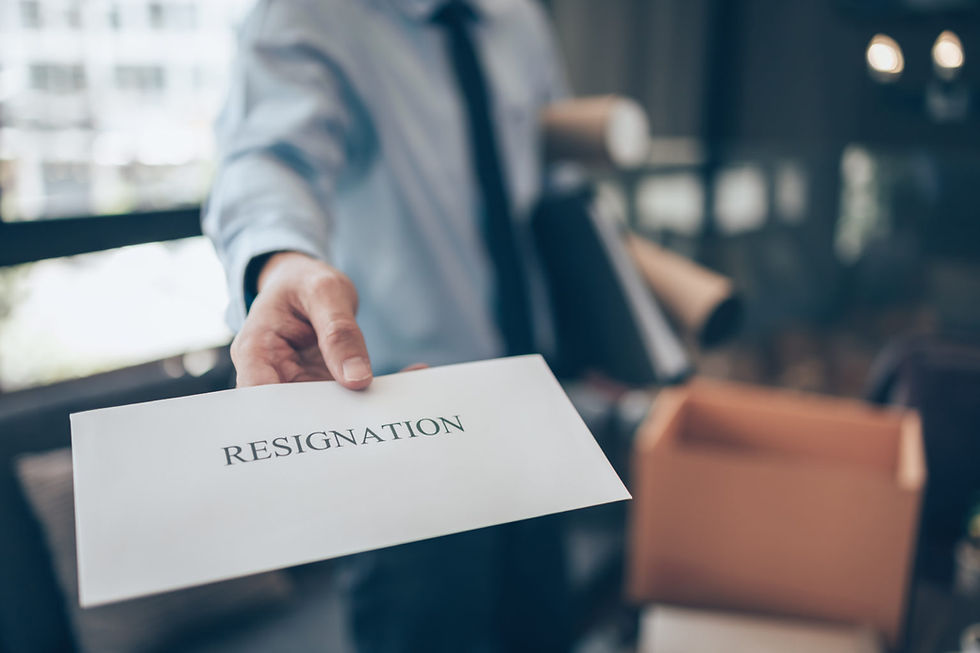How to Write a Powerful Resignation Letter: A Step-by-Step Guide
- James Pite
- Apr 10, 2025
- 3 min read

Walking away from a job can be bittersweet—whether it’s a leap toward new opportunities or a much-needed escape from a toxic environment. Regardless of the reason, a well-written resignation letter is essential. Done right, it leaves a lasting impression, maintains professional relationships, and cements your reputation as a class act.
Let’s dive into how to write a powerful resignation letter that strikes the perfect balance between professionalism, gratitude, and assertiveness.
Why a Strong Resignation Letter Matters
A resignation letter is more than a mere formality—it's your final chance to shape how you're remembered. A polished, professional resignation letter can:
✅ Protect Your Reputation: Leaving on good terms can lead to glowing references and future opportunities.
✅ Set the Tone for Your Departure: A clear, assertive letter ensures there’s no room for miscommunication.
✅ Showcase Professionalism and Gratitude: Even if the experience wasn’t ideal, expressing appreciation shows maturity.
🔗 Authoritative Source: According to Business News Daily, a well-crafted resignation letter can strengthen relationships and keep doors open.
How to Structure a Powerful Resignation Letter
A resignation letter should be concise yet impactful, typically including:
1. Start with a Clear Statement of Resignation
Kick off with a straightforward declaration:
✅ Example: "Please accept this letter as my formal resignation from [Company Name], effective [Last Working Day]."
This approach sets the tone—no ambiguity or hesitation. Being clear avoids any confusion and frames the conversation professionally.
2. State Your Last Working Day
Mention your last working day, respecting your notice period (typically two weeks, unless your contract specifies otherwise).
✅ Example: "My last working day will be [Date], giving ample time for a smooth transition."
This gives your employer a timeline to manage your departure and fill the position if needed.
3. Express Gratitude (Even If It’s Tough)
Even if your experience was less than ideal, highlighting positive aspects shows maturity and professionalism. Gratitude is key, but sincerity is crucial—forced compliments can feel disingenuous.
✅ Example: "I am grateful for the opportunities to grow professionally and personally during my time at [Company Name]. Working alongside talented individuals has been a rewarding experience."
If you genuinely struggled, focus on transferable skills gained or meaningful connections made.
4. Offer Assistance During the Transition
Showing willingness to help with the transition leaves a positive final impression. It’s a professional courtesy that won’t go unnoticed.
✅ Example: "I am committed to ensuring a smooth handover and am happy to assist in training my replacement if needed."
This shows you care about the company’s continuity even after you leave.
5. End on a Polite, Positive Note
Wrap up with a positive outlook, reaffirming your gratitude.
✅ Example: "Thank you once again for the opportunities provided. I look forward to staying in touch and wish [Company Name] continued success."
Ending on a high note keeps relationships intact and makes future networking easier.
Common Mistakes to Avoid in a Resignation Letter
❌ Burning Bridges: Avoid venting frustrations or criticising the company. No matter how valid your grievances, a resignation letter is not the place to air them.
❌ Being Vague About Your Departure: Be explicit about your decision to resign. Avoid wishy-washy phrasing that could lead to misunderstandings.
❌ Writing a Novel: Keep it professional and concise. A resignation letter is not your memoir.
🔗 Authoritative Source: Indeed emphasises that a brief, professional letter strengthens relationships even after leaving.
Client Success Story: Graceful Exit, Future Gains
One of our clients, frustrated with a toxic work environment, needed a resignation letter that maintained professionalism despite her grievances. We helped her create a powerful yet diplomatic letter, highlighting her contributions and expressing gratitude while making her departure clear.
Result? Her resignation letter left a lasting impression—she received a glowing reference and reconnected with former colleagues who later helped her secure a dream job. A strong resignation letter can truly shape your professional future!
Final Thoughts: Leave on the Best Terms Possible
Resigning gracefully isn’t just a nicety—it’s a strategic move that can impact your future career. A well-crafted resignation letter helps you:
✔ Maintain Your Professional Reputation
✔ Leave on Positive Terms
✔ Keep the Door Open for Future Opportunities
When in doubt, get expert assistance. A professional letter writing service can help you leave a job on the best possible terms.
📩 Ready to Resign? Let’s Make It Memorable!
Need a powerful resignation letter that says all the right things? Our professional writing service can help you handle this career transition with finesse—no awkward goodbyes or burnt bridges.




Comments